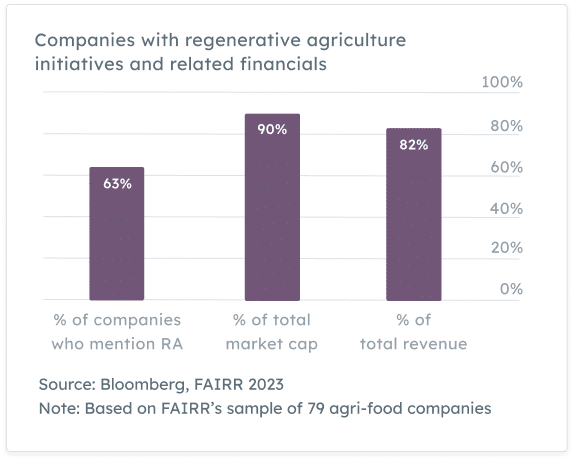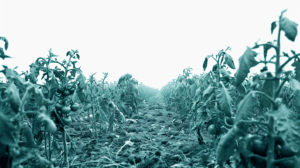The UN Environment Program underscores the urgency of tripling annual investments in nature to approximately USD $400 billion. This financial endeavor is daunting but pales in comparison to the colossal spending power of the 79 companies evaluated by FAIRR. The FAIRR Initiative assessed 79 publicly listed agri-food companies with a combined annual revenue of USD $3 trillion, equivalent to nearly a third of the global agri-food sector. With an annual production expenditure of USD $2.6 trillion, these industry giants wield a significant influence on the global food systems landscape. Redirecting a substantial portion of this corporate spending towards nature-positive production systems could be a transformative force in addressing the financing required for a sustainable food systems transformation.
Sustainability Strategies and Regenerative Agriculture
FAIRR’s assessment reveals that 63% of the 79 evaluated companies explicitly incorporate regenerative agriculture into their sustainability blueprints. This strategic move is not confined to a specific market segment but resonates across industry leaders like Walmart, Nestlé, PepsiCo, Costco, and McDonald’s, whose combined annual revenue surpasses USD $3 trillion, constituting nearly a quarter of the agri-food sector’s global revenue.
The landscape of regenerative agriculture adoption reveals a notable skew towards larger companies by revenue and market capitalization, particularly prevalent in North America and Europe.
Quantification Challenges and Corporate Targets
While larger companies, on average, are expected to set quantified targets, the reality is nuanced. Despite a 20% size advantage over their counterparts, not all larger companies uniformly commit to quantified regenerative agriculture targets. For instance, Ingredion, with a market capitalization of USD $6.6 billion, stands out with a company-wide target, unlike larger entities like Costco (USD $240 billion) or Starbucks (USD $110 billion).

Source: Bloomberg, FAIRR 2023
Companies like General Mills and Nestlé are leading the change with ambitious commitments, underscoring the pivotal role of corporate investment in shaping a more sustainable future for the agri-food industry.
Target: Regenerative agriculture practices on 1 million acres of farmland by 2030
General Mills is committed to advancing regenerative agriculture on 1 million acres of farmland by 2030, aligning with their climate and water goals. The principles of regenerative agriculture involve minimizing disturbance, maximizing diversity, keeping soil covered year-round, maintaining a living root year-round, and integrating livestock. General Mills partners with farmers, offering programs with coaching, technical assistance, soil health testing, and economic assessments. Their efforts focus on biodiversity, water efficiency, healthy soil, herd well-being, and farmer economic resilience. Collaborations with Soil Health Academy, Understanding Ag, and conservation organizations aim to drive progress. General Mills invests in research, technology, and partnerships with organizations like the Ecosystem Services Market Consortium to measure environmental and economic outcomes, emphasizing the importance of regenerative agriculture in their product line.
General Mills announced in October 2023 their partnership with Walmart and Sam’s Club to advance regenerative agriculture across 600,000 acres by 2030, supporting their stated goal above.
Target: Source 50% of its key ingredients through regenerative agriculture by 2030
Nestlé is committed to advancing regenerative agriculture, aiming for 50% of key ingredients from regenerative methods by 2030. Regenerative agriculture involves improving soil health, protecting water resources, and increasing biodiversity. Nestlé focuses on biodiversity, water security, soil health, diverse cropping systems, and livestock integration. Initiatives include tree planting, efficient irrigation, organic fertilization, and regenerative farming practices. Nestlé invests CHF 1.2 billion by 2025 to promote regenerative agriculture, guided by the Nestlé Regenerative Agriculture Framework. Their approach includes pilot studies, reference farms, and scaling through the Farmer Connect program. The strategy aligns with industry frameworks and emphasizes a just transition for farmers, promoting human rights and supporting livelihoods.








